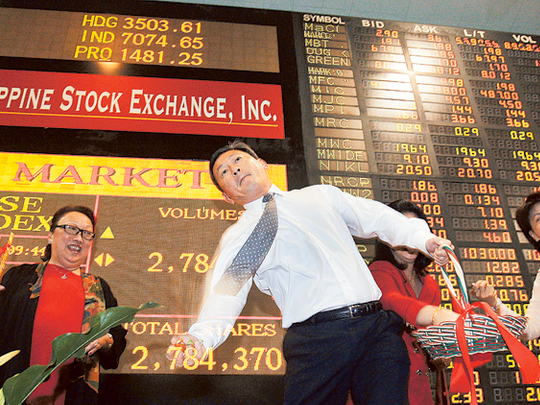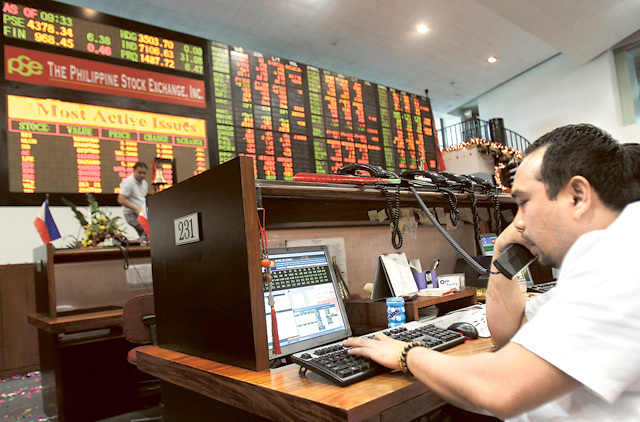
Dubai: The latest deluge that brought life to a standstill in the Philippines seems not to have dampened its financial market.
On Wednesday, August 8, when the Philippines stock exchange resumed trading after it was suspended the day before due to inclement weather, PSEi, its 30-company benchmark index, closed the day higher at 5,308.38, up 0.46 per cent.
Aided by funds from foreign investors, trying to get away from the debt crisis of Europe, the Philippines stock market this year has climbed 22 per cent, hitting record highs more than 20 times.
Much of the surging foreign interest in the Philippines market since last year is credited to the government’s proactive efforts to reign in fiscal deficit, tackle rampant corruption and create a business-friendly environment. This has contributed to a ratings upgrade from all three major credit agencies: Standard & Poors, Moody’s and Fitch.
While the Philippines stock market has emerged as the year’s top performer in Southeast Asia, it has also become the most expensive, currently trading at 17 times expected earnings compared to Thailand’s 10.5 times and Indonesia’s 12.1 times.
In their July 16 report, Nomura Asset Management wrote that while the Philippines market, like Thailand and Indonesia, remain insulated from the global woes, these markets are no longer cheap and it was going to keep its current, overweight positions.
Asean Investment Management currently has limited exposure to the Philippines market. “We are underweight due to valuation issues,” said David O’Neil, its Singapore-based chief investment officer, “Currently value is lacking in the market.”
Sound fundamentals
But, despite steep valuations, some investors still see the index continuing to climb due to the country’s strong economic outlook for the coming years.
“Over a two to three-year horizon, we believe the Philippine market has strong legs to sustain its uptrend given its sound economic fundamentals — five to six per cent annual GDP growth and strong corporate earnings expansion in the range of 10 per cent to 15 per cent,” said Maria Theresa M. Javier, senior vice-president and group head, BPI Asset Management, the biggest unit trust company in the Philippines.
It has investments worth 130 billion pesos (Dh11.4 billion) under management. Gregg Adrian R. Ilag, equity analyst at AB Capital Securities Inc., agreed. “Even though valuations are high, they are not at illogical levels. I expect earnings to catch up, eventually easing valuations to decent levels.”
BPI’s Asset Management’s outlook is at least a double-digit CAGR [compounded annual growth rate] for market returns, sustained until 2014, said Javier.
O’Neil of Asean Investment Management expects an upside of more than 30 per cent over the next two to three years.
In their July report, asset management firm Maybank ATR Kim Eng said that there are several factors that give the index room to rise.
“One is sustained growth in government spending that can offset weakness coming from developed economies and major emerging markets,” writes Luz Lorenzo, market strategist and head of research at Maybank, in the report. And that is the reason for the bank to upgrade the 2012 GDP forecast to 5.4 per cent from 5 per cent previously.
Attracting capital
He also cites that keeping interest rates low, because of low inflation of 3 per cent year on year for the first half of 2012, is likely to positively impact the market.
Next year’s outlook for inflation remains benign and it is likely that low interest rates will continue to attract capital flows into the Philippines. His optimism is also based on robust private consumption, which accounts for 70 per cent of the GDP, and which has shown no signs of flagging.
“We see the risks as mostly coming from a prolonged and protracted global economic slowdown given the financial volatility in the Eurozone, the fiscal problem in the US, and China’s own growth concerns,” said Javier. “Politically, the risk may come from a possible escalation of tension with China, pertaining to the Scarborough Island.”
Ilag is also wary about inflation. “In terms of risk, we think that significant risk comes from inflation over the long term,” he said. “The current easing measures will cause higher inflation in the years to come.”













